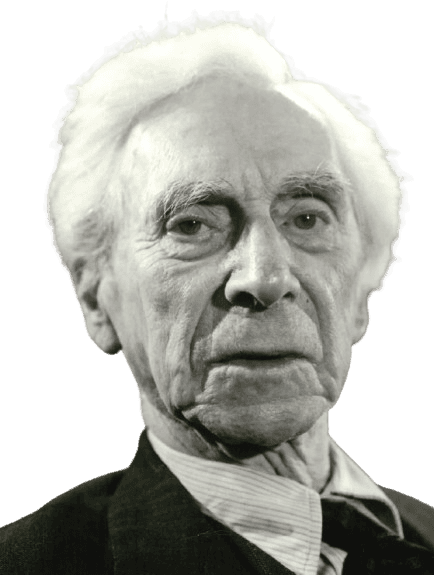Life and achievements
Early life
Bertrand Russell was born in a well-to-do family in Trellech, Wales, on May 18, 1872. He was an orphan by the age of six since he lost his mother, father, and sister. Russell's childhood was quite unconventional because he was brought up by his grandparents, mainly his grandmother, who was strict and had Victorian values. However, he was always interested in mathematics and philosophy, which predetermined his future activities.
Russell had his early education at home and was introduced to several subjects, including Latin and Greek. He was a man of good understanding and could read almost anything he got his hands on, ranging from literature to science. When he was 11 years old, his elder brother, Frank, presented him with Euclid's geometry, which he described as one of his life's best moments. This early interest in mathematics can be attributed to his early education, as he had a good foundation in mathematics.
Russell entered Trinity College, Cambridge, in 1890 with a scholarship to read mathematics and philosophy. He was equally good in both fields and secured first class in his graduation. This period was important as it saw him associate with scholars such as Alfred North Whitehead and G. E. Moore, with whom he was to be friends and co-workers. This time in Russell's life led him to the work he would do later: logic and analytic philosophy.
Legacy
Russell has dramatically influenced society in philosophy, mathematics, social justice, and education. He was one of the first to lay down the foundation of analytic philosophy; his contributions to logic and language are still relevant in today's society. Some of his most important work was done with Alfred North Whitehead; this work, Principia Mathematica, is still considered one of the most essential works in mathematical logic and has influenced many generations of philosophers and mathematicians.
Apart from being a philosopher and a mathematician, Russell was a social critic and a political activist. His views on non-violence, nuclear weapons, and social equality earned him much attention. These include his support for the peace cause and his participation in the peace movement, particularly during the Vietnam War, which made him a man of the people, particularly in matters concerning the heart. His work in disarmament, especially the Russell-Einstein Manifesto, is still valid to this date.
Russell also made a significant contribution to education. He co-established Beacon Hill School, a progressive school that encouraged critical thinking and creativity. Some of his works in education are On Education, Especially in Early Childhood, which influenced the educational systems.
Russell's contribution, however, continued beyond the academic and literary writing levels. Due to their clarity, his books, such as A History of Western Philosophy and The Problems of Philosophy, are well-known and widely read. He could break down his language in his research and writing and pass information to the public.
Milestone moments
Jun 19, 1890
Trinity College, Cambridge Admission
Bertrand Russell was admitted to Trinity College, Cambridge, in June 1890 as a scholar, marking the beginning of his academic experience.
This was a significant incident in Russell's life since he focused on studying mathematics and philosophy.
At Cambridge, Russell was surrounded by some of the greatest minds of the time, such as Alfred North Whitehead and G. E. Moore, with whom he remained friends and colleagues for the rest of his life.
He received a good education from Trinity College and was able to contribute significantly to the advancements of logic, analytic philosophy, and mathematical theory in the future.
Russell attended university and received his degree with distinction. He was known in society as a philosopher and mathematician.
Jun 14, 1916
The Case of Pacifism at Trinity College and Expulsion
Bertrand Russell was expelled from Trinity College, Cambridge, in June 1916 during World War I for being a pacifist.
Russell was arrested under the Defence of the Realm Act because of his opposition to the war and his activities, including writing and speaking against it.
This dismissal can be considered one of Russell's significant events since it boosted his social and political activism.
However, this did not prevent Russell from advocating for peace and freedom of speech, thus strengthening his image as a courageous and noble philosopher.
This period influenced his subsequent theories on political and civil rights and liberties.
Mar 14, 1927
Publication of "Why I Am Not a Christian"
Bertrand Russell delivered a lecture in March 1927, which he developed into an essay. This lecture was entitled "Why I Am Not a Christian."
This work would become one of Russell's most famous and provocative works, encapsulating his views on religion and Christianity.
Russell denied God, the soul, and religion as moral and as having the right to direct people.
Thus, the essay also helped to strengthen Russell's position as one of the most significant advocates of secularism and the use of reason.
It also attracted much publicity, both positive and negative, which helped to increase Russell's profile as a public philosopher.
Oct 15, 1945
Publication of A History of Western Philosophy
In October 1945, Bertrand Russell wrote A History of Western Philosophy, a general introduction to Western philosophy.
This work became popular and thus contributed to the process of bringing philosophy closer to the general public.
For this reason, Russell's writing is evident and straightforward, and anyone can easily comprehend the philosophy.
This made Russell a financially secure man and one of the most famous philosophers of the twentieth century.
A History of Western Philosophy is still widely used to get information about philosophy.
